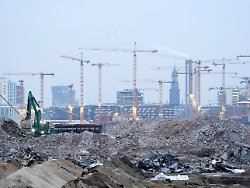Tuesday, November 16, 2021
9.8 billion euros less
Industry throttles investments in the corona year
Whether machines, new systems or tools: In the year 2020, which was massively shaped by the Corona crisis, German industrial companies made significantly fewer investments than in the previous year, at almost 9.8 billion euros. The last time there was a major decline was due to the financial crisis in 2009.
In the past Corona year, German industry saved more investments than it has done since the global financial crisis in 2009. In 2020, it put just under 9.8 billion euros or 13.9 percent less in property, plant and equipment such as machines, land with buildings or tools, as the Federal Statistical Office announced.
The last time there was a bigger decline was due to the financial crisis in 2009, when even 22 percent less was spent. Against the trend, the investment volume only increased in the chemical industry in 2020: Here there was an increase of 3.8 percent to 6.1 billion euros. The mechanical engineering sector recorded an above-average decline of minus 22.6 percent to 6.0 billion euros.
The manufacturers of metal products saw a slump of 22.0 percent to 3.6 billion euros, and in the auto industry from 18.5 percent to 13.7 billion euros. The four largest sectors – the automotive and chemical industries as well as mechanical engineering and manufacturers of food and animal feed – accounted for a volume of 30.5 billion euros. That corresponds to a good half of the investments made by German industry.
The corona pandemic caused the German economy to collapse by 4.6 percent last year. That was the biggest decline since the global financial crisis in 2009, when the gross domestic product fell by 5.7 percent. An economic recovery is expected for the current year, although this should be weaker than originally assumed.
The federal government recently cut its forecast for economic growth in 2021 – from 3.5 to 2.6 percent. In the coming year, the gross domestic product is expected to increase by 4.1 percent. According to a survey by the German Chamber of Commerce and Industry, the industry intends to invest significantly more again in the coming year. Raw material and delivery bottlenecks, but also the shortage of skilled workers, would hinder production and thus partially destroy the actual implementation of investment plans.
